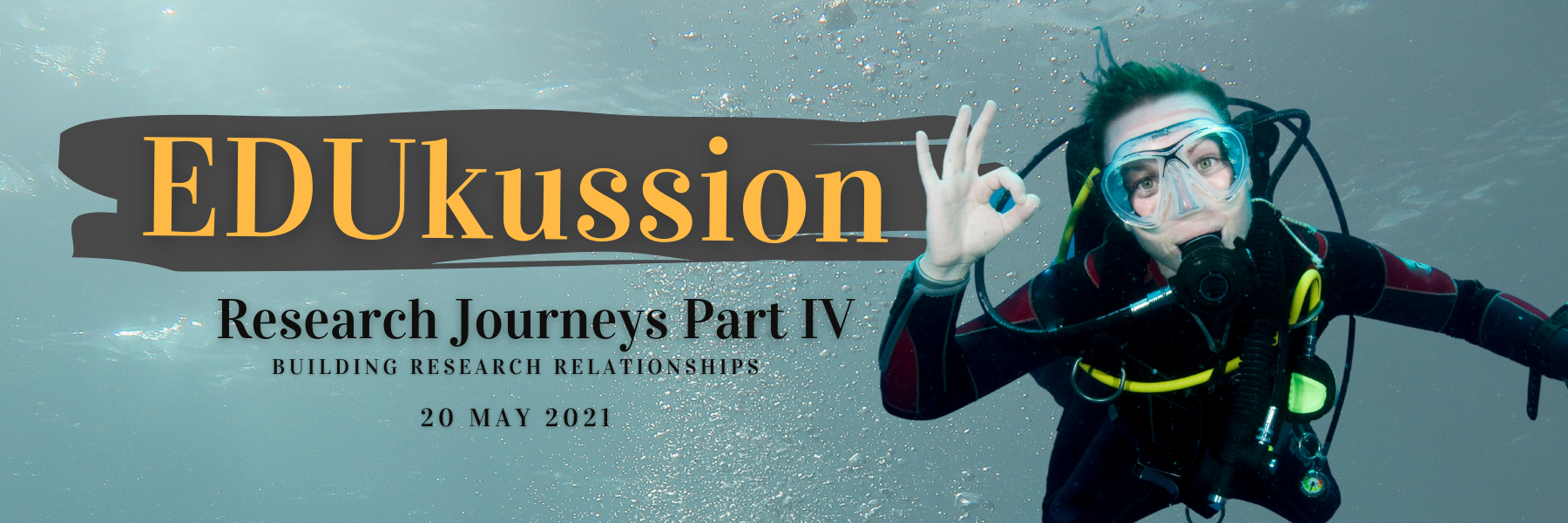The fourth installment of the Research Journeys series, entitled “Building Research Relationships”, was hosted via Zoom last 20 May 2021. One UPOU alumna and one faculty from the Faculty of Education (FEd) shared their stories while they were writing their research.
All journeys are similar in such a way that these all have lead characters, purpose, challenges, and of course – supporting characters. In the case of the academe, we have the students contributing to the body of knowledge through the thesis with the help of their advisers. Sure enough, there is no easy journey especially when it comes to research.
The Nature of Advisee-Adviser Relationship
Asst. Prof. Elizabeth Segura-Krueger, a MLLE alumna, shared her research journey. Her thesis was about an evaluative case study on teaching in large classes which she mentioned was ‘hitting two birds with one stone’ because she is working as a professor.
One of the tips she mentioned was to listen to your adviser when he/she asks you the dreaded question “Why should I care?”. Though the question may seem demotivating, you must understand that your advisers mean well as one’s research cannot be born without purpose. You must care, so that your readers would.
Asst. Prof. Maria Rowena Raymundo, the current Program Chair of the Graduate Certificate and Master of Distance Education Program (GC/MDE), gave the participants a brief background about MDE and started differentiating the special problem and thesis in the MDE context to which she mentioned that special problem is application-oriented whereas thesis is more concerned with the student’s contribution with the body of research.
Asst. Prof. Raymundo mentioned that her passion for teaching made her enroll in the MDE program. She shared her experiences and challenges in doing qualitative research as her capstone/EDDE 298 requirement in which she struggled with because of her scientific background.
The Value of Research Relationships
One’s journey is not complete without the relationships built along the way. As you thrive in this challenging world of research, the most important relationship you must maintain is your relationship with your adviser.
Your relationship with your adviser is like all your existing relationships – for example, the relationship between you and your co-worker. It must be harmonized and is a give and take. Though it is easier said than done, maintaining a harmonized relationship with your adviser is one of the challenges you might encounter in your research journey.
There are common challenges in adviser-advisee relationships and workarounds such as lack of engagement, conflicts, and demotivation.
“Try to understand and come up with an agreement with the time schedules. Everybody has priorities. It is a give and take relationship and that is how it worked with my adviser.” This is what Asst. Prof. Krueger shared when certain challenges in the relationship with her thesis adviser arise. Truly, healthy communication is a must.
Demotivation is the biggest hurdle you must overcome as everything in this research journey depends on you as the researcher. Asst. Prof. Raymundo shared that there were times when she felt discouraged with the slow progress of her research. When faced with the uncertainty and doubts, she said that she drew her strength from her support group (family) and from her faith in God.
When challenges such as these arise, you must remember the following: 1) manage your expectations, 2) understand the differences between you and your adviser, and 3) build your support groups/system.
The Role of the Adviser
“I thought I was already good in research given my background and experience – turns out I was not” – Maria Rowena Raymundo, 2021
This is where the role of the adviser is found to be crucial. Advisers have different approaches to their advisees, but they all have the same purpose – to guide you in your research journey. Asst. Prof. Krueger mentioned that “This rewriting, revising, and getting the feedback from my adviser helped me (in) coming up with something that is relevant and easy to read.”
Final Words
Indeed, a fruitful research journey is not one without difficulties and challenges. To overcome these, Asst. Prof. Raymundo shared that staying connected and keeping yourself healthy and exercised are very important. Dr. Juliet Aleta Villanueva, EDUkussion Lead Organizer, also emphasized the importance of having a good support group throughout your research journey. For other FEd students, interactions and support gained from a research consortium would also be of help.
In the end, both speakers would like to share their uplifting words for all researchers who are struggling with their respective research journeys:
“When the goal is near, the waves go higher, and one should not drown in it.” – Elizabeth Segura-Krueger
“People should be kinder with themselves. I usually tell my students to manage their expectations on oneself, of others, and their thesis adviser. I believe that there is a need to redefine the standards on what is ‘best’. For me, being the “best” is the best that you can be at that moment.” – Maria Rowena Raymundo
Written by
CJBSillos & KMLFama

